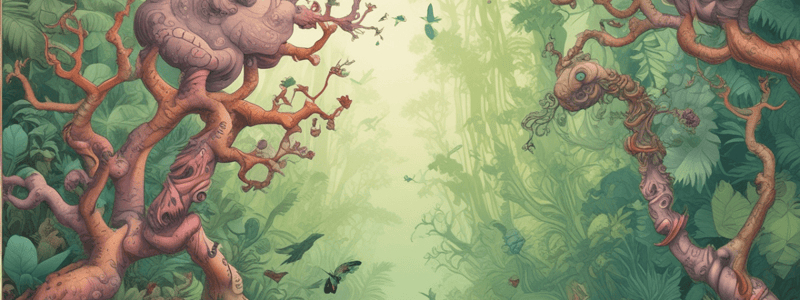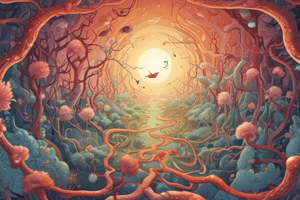Podcast
Questions and Answers
Match the following biology branches with their descriptions:
Match the following biology branches with their descriptions:
Botany = Study of animals Zoology = Study of plants Microbiology = Study of microorganisms Ecology = Study of interactions between organisms and their environment
Match the following cellular processes with their descriptions:
Match the following cellular processes with their descriptions:
Photosynthesis = Process of cell division Respiration = Process of releasing energy from glucose Mitosis = Process of producing energy from sunlight Meiosis = Process of cell division that results in four daughter cells
Match the following genetic information with their descriptions:
Match the following genetic information with their descriptions:
DNA = RNA molecule that carries genetic information RNA = Molecule that carries genetic information from DNA to ribosomes Genes = Segments of DNA that code for a specific trait Chromosomes = Thread-like structures that carry genes in the nucleus
Match the following evolutionary concepts with their descriptions:
Match the following evolutionary concepts with their descriptions:
Match the following ecosystem components with their descriptions:
Match the following ecosystem components with their descriptions:
Match the following ecological relationships with their descriptions:
Match the following ecological relationships with their descriptions:
Match the following cell structures with their descriptions:
Match the following cell structures with their descriptions:
Match the following biodiversity concepts with their descriptions:
Match the following biodiversity concepts with their descriptions:
Match the following conservation biology concepts with their descriptions:
Match the following conservation biology concepts with their descriptions:
Match the following molecular biology concepts with their descriptions:
Match the following molecular biology concepts with their descriptions:
Flashcards are hidden until you start studying
Study Notes
Definition and Scope
- Biology is the scientific study of life and living organisms
- Examines the structure, function, growth, evolution, and taxonomy of living things
- Encompasses all aspects of life, from molecules to ecosystems
Branches of Biology
- Botany: study of plants
- Zoology: study of animals
- Microbiology: study of microorganisms
- Ecology: study of interactions between organisms and their environment
- Biochemistry: study of chemical processes in living organisms
- Molecular Biology: study of biological molecules and their interactions
- Genetics: study of heredity and variation
- Evolutionary Biology: study of the processes that have shaped the diversity of life
Cells and Cellular Processes
- Cell Structure: cell membrane, cytoplasm, nucleus, mitochondria, ribosomes
- Cellular Processes: photosynthesis, respiration, mitosis, meiosis
- Cell Division: mitosis, meiosis, cytokinesis
- Genetic Information: DNA, RNA, genes, chromosomes
Evolution and Diversity
- Evolution: change in species over time through natural selection and genetic drift
- Species: group of interbreeding organisms
- Classification: system of categorizing organisms into groups based on shared characteristics
- Phylogeny: study of evolutionary relationships between organisms
- Biodiversity: variety of species, ecosystems, and genes in an environment
Ecosystems and Ecology
- Ecosystem: community of organisms and their environment
- Ecological Relationships: predator-prey, competition, symbiosis
- Energy Flow: producers, consumers, decomposers
- Ecosystem Services: provisioning, regulating, cultural, supporting
- Conservation Biology: preservation and protection of ecosystems and biodiversity
Biology and Its Scope
- Biology is the scientific study of life and living organisms, examining their structure, function, growth, evolution, and taxonomy.
- It encompasses all aspects of life, from molecules to ecosystems.
Branches of Biology
- Botany is the study of plants.
- Zoology is the study of animals.
- Microbiology is the study of microorganisms.
- Ecology is the study of interactions between organisms and their environment.
- Biochemistry is the study of chemical processes in living organisms.
- Molecular Biology is the study of biological molecules and their interactions.
- Genetics is the study of heredity and variation.
- Evolutionary Biology is the study of the processes that have shaped the diversity of life.
Cells and Cellular Processes
Cell Structure
- A cell consists of a cell membrane, cytoplasm, nucleus, mitochondria, and ribosomes.
Cellular Processes
- Photosynthesis is a cellular process.
- Respiration is a cellular process.
- Mitosis is a cellular process.
- Meiosis is a cellular process.
Cell Division
- Mitosis is a type of cell division.
- Meiosis is a type of cell division.
- Cytokinesis is a type of cell division.
Genetic Information
- DNA (Deoxyribonucleic acid) is a molecule that contains genetic information.
- RNA (Ribonucleic acid) is a molecule that contains genetic information.
- Genes are units of heredity.
- Chromosomes are thread-like structures that carry genes.
Evolution and Diversity
Evolution
- Evolution is the change in species over time through natural selection and genetic drift.
Species
- A species is a group of interbreeding organisms.
Classification
- Classification is a system of categorizing organisms into groups based on shared characteristics.
Phylogeny
- Phylogeny is the study of evolutionary relationships between organisms.
Biodiversity
- Biodiversity refers to the variety of species, ecosystems, and genes in an environment.
Ecosystems and Ecology
Ecosystem
- An ecosystem is a community of organisms and their environment.
Ecological Relationships
- Predator-prey relationships exist in ecosystems.
- Competition exists in ecosystems.
- Symbiosis exists in ecosystems.
Energy Flow
- Producers, consumers, and decomposers are components of energy flow in ecosystems.
Ecosystem Services
- Provisioning services are provided by ecosystems.
- Regulating services are provided by ecosystems.
- Cultural services are provided by ecosystems.
- Supporting services are provided by ecosystems.
Conservation Biology
- Conservation Biology is the preservation and protection of ecosystems and biodiversity.
Studying That Suits You
Use AI to generate personalized quizzes and flashcards to suit your learning preferences.




